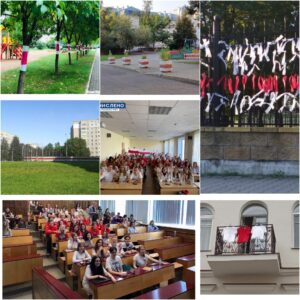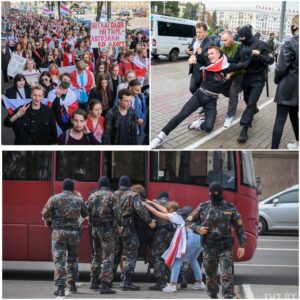Economy in recession, protests continue despite repressions – Belarus civil society digest

For a whole month, starting from August 9th, Belarusians continue daily protests demanding new presidential elections. The traditional Sunday’s rallies gather hundreds of thousands of people in Minsk and thousands in regions. Last Sunday, on September 6th, for the first time, peaceful protests were overshadowed by police provocations.
- Protests and solidarity actions across the country become decentralized and self-organized. The bright example is the Minsk courtyard on Chervyakova, where neighbors persistently restore a mural with DJs of Change and hang white-red-white flags every time the police removes them. Students and university teachers, athletes, IT sector, women continue civic resistance in different forms.
- Strikes. Amid intimidation and new arrests of strike committee leaders, focal resistance continues. Miner handcuffs himself to protest election results and lawlessness. On September 11, the Minsk Court considered the legality of the strike at Belaruskali enterprise; those who came to the courthouse to support the workers were detained.
- Economy in recession. During the month of protests, the exchange rates of the dollar and euro rose to a record by 18%-27% since the beginning of the year. Fearing devaluation, the population is buying up the currency and withdrawing deposits ($226 million during the last month). In August, the National Bank spent 15% of its gold and foreign exchange reserves to support the Belarusian ruble. In 2020, the budget is in deficit and is $2.4 billion.
- Civil society continues monitoring, financial and other support to victims of repression. Belarus Free Theatre initiates a global artistic solidarity campaign with Belarus. The Inclusive Barista initiative offers a free cup of coffee to protesters. The Belarusian National Platform urges to postpone the launch of Belarusian NPP due to the political crisis. CSO leaders are detained, while a number of CSOs are ordered to report on the use of foreign aid (grants) since the beginning of the year.
- Coordination Council. Six out of seven leaders of the Coordination Council were either detained or forcibly taken abroad. Maria Kolesnikova averted expulsion by tearing up her passport and later was arrested in a criminal case on the seizure of power. Only Nobel laureate Svetlana Alexievich is currently at large but tells that strangers terrorize her – EU Ambassadors visited her at home to support. The opposition leader Sviatlana Tsikhanouskaya encourages everyone to become members of the Coordination Council.
- Repressions. The authorities increase the degree of brutality but have not yet reached the level of the first days of repressions. Lukashenka states that “sometimes there is no time for laws, and tough measures must be taken to stop all the rubbish.” At least 10,500 people were detained during the month of protests. Criminal cases are initiated against over 100 participants of post-election protests. 58 political prisoners remain in jail, including 9 new political prisoners this week – Maria Kolesnikova, PandaDoc IT company staff, and others.
- Crackdown on independent media. The Ministry of Information issued the 3rd warning to TUT.BY portal, while two warnings during the year are enough to block the website. RT, a Russian state-controlled TV network, confirms that 32 Russian journalists work in Belarus now. Investigative Committee responded to BAJ that its appeal concerning the detention of 47 journalists was “abstract”. The new public campaign MediaSOL raises money to help independent media and journalists.
- International reaction. The U.S. calls on the Belarusian authorities to end the violence against their own people. The EU High Representative expects the Belarusian authorities to engage in an inclusive national dialogue. Lithuania recognizes Tsikhanouskaya as the “leader elected by Belarusian people” and is prepared to assume leadership for mediating the dialogue in Belarus. Three “brave women,” Tsikhanouskaya, Kalesnikava, and Tsapkala have been nominated for Sakharov Prize. PACE sets up an international body to investigate human rights crimes in Belarus. Lukashenka will visit Moscow next week.
- COVID-19. Over 73,000 Belarusians positively tested for and 738 died due to COVID-19. Meanwhile, the UN date indicates that the mortality rate for the first half of the year in Belarus beats a five-year record and is 5,600 people more than a year earlier. IMF refuses to allocate $940 million to Belarus to counter the pandemic consequences.
Belarus Digest prepared this overview on the basis of materials provided by Pact. This digest attempts to give a richer picture of the recent political and civil society events in Belarus. It often goes beyond the hot stories already available in English-language media.
https://belarusdigest.com/story/economy-in-recession-protests-continue-despite-repressions-belarus-civil-society-digest/



